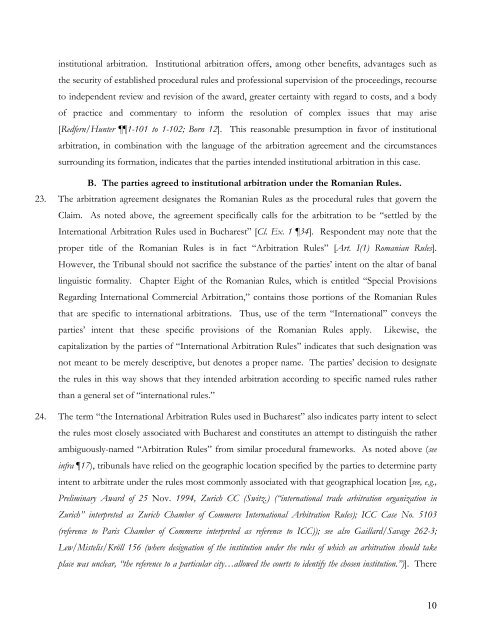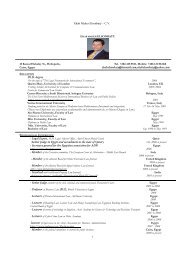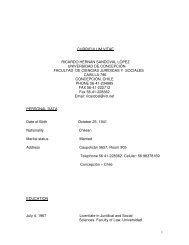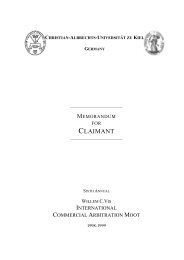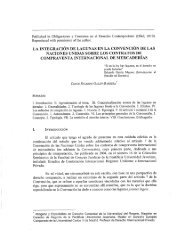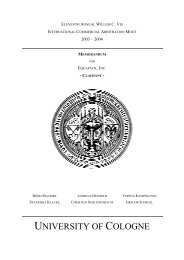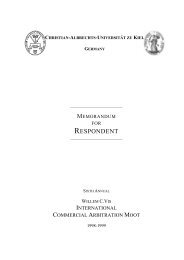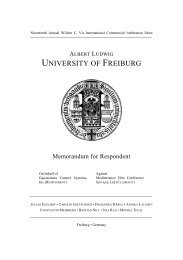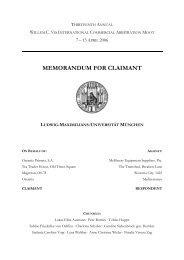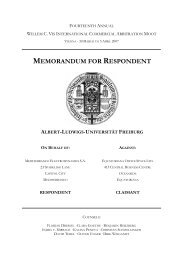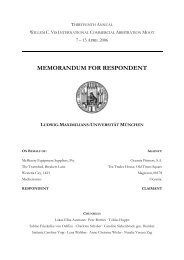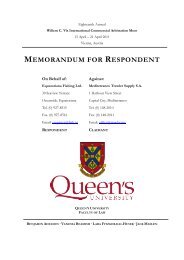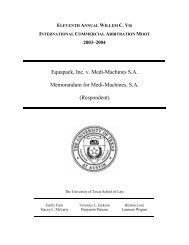CLAIMANT 0800 FINAL 12072006
CLAIMANT 0800 FINAL 12072006
CLAIMANT 0800 FINAL 12072006
Create successful ePaper yourself
Turn your PDF publications into a flip-book with our unique Google optimized e-Paper software.
institutional arbitration. Institutional arbitration offers, among other benefits, advantages such as<br />
the security of established procedural rules and professional supervision of the proceedings, recourse<br />
to independent review and revision of the award, greater certainty with regard to costs, and a body<br />
of practice and commentary to inform the resolution of complex issues that may arise<br />
[Redfern/Hunter 1-101 to 1-102; Born 12]. This reasonable presumption in favor of institutional<br />
arbitration, in combination with the language of the arbitration agreement and the circumstances<br />
surrounding its formation, indicates that the parties intended institutional arbitration in this case.<br />
B. The parties agreed to institutional arbitration under the Romanian Rules.<br />
23. The arbitration agreement designates the Romanian Rules as the procedural rules that govern the<br />
Claim. As noted above, the agreement specifically calls for the arbitration to be “settled by the<br />
International Arbitration Rules used in Bucharest” [Cl. Ex. 1 34]. Respondent may note that the<br />
proper title of the Romanian Rules is in fact “Arbitration Rules” [Art. I(1) Romanian Rules].<br />
However, the Tribunal should not sacrifice the substance of the parties’ intent on the altar of banal<br />
linguistic formality. Chapter Eight of the Romanian Rules, which is entitled “Special Provisions<br />
Regarding International Commercial Arbitration,” contains those portions of the Romanian Rules<br />
that are specific to international arbitrations. Thus, use of the term “International” conveys the<br />
parties’ intent that these specific provisions of the Romanian Rules apply. Likewise, the<br />
capitalization by the parties of “International Arbitration Rules” indicates that such designation was<br />
not meant to be merely descriptive, but denotes a proper name. The parties’ decision to designate<br />
the rules in this way shows that they intended arbitration according to specific named rules rather<br />
than a general set of “international rules.”<br />
24. The term “the International Arbitration Rules used in Bucharest” also indicates party intent to select<br />
the rules most closely associated with Bucharest and constitutes an attempt to distinguish the rather<br />
ambiguously-named “Arbitration Rules” from similar procedural frameworks. As noted above (see<br />
infra 17), tribunals have relied on the geographic location specified by the parties to determine party<br />
intent to arbitrate under the rules most commonly associated with that geographical location [see, e.g.,<br />
Preliminary Award of 25 Nov. 1994, Zurich CC (Switz.) (“international trade arbitration organization in<br />
Zurich” interpreted as Zurich Chamber of Commerce International Arbitration Rules); ICC Case No. 5103<br />
(reference to Paris Chamber of Commerce interpreted as reference to ICC)); see also Gaillard/Savage 262-3;<br />
Lew/Mistelis/Kröll 156 (where designation of the institution under the rules of which an arbitration should take<br />
place was unclear, “the reference to a particular city…allowed the courts to identify the chosen institution.”)]. There<br />
10


